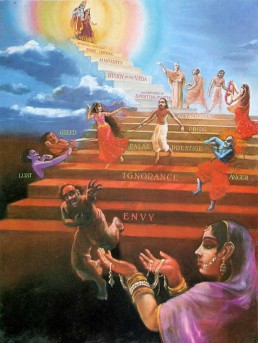Since the Self is the source of all existence and energy, all other apparent activities that are seen at the level of matter, must come from the same great, grand motive force. Every part of a railway engine is made up of cold iron, and if the engine can run forward carrying along with it a train-load of passengers and goods, there must be something other than iron that is giving it the power to move. Similarly, when ego-centric deluded men, considering themselves to be their body or mind or intellect, act in the world outside, they express a kind of seeming dynamism through their matter vestures. When those who are living in the matter-outskirts of the Palace of Truth, struggle hard to eke out satisfaction and happiness, fulfilling their desires, they too act invoking all their energies from the Spirit.
Even when the deluded ego-centres want to live in their realm of ignorance and sorrows, they must necessarily invoke the required energy and sentiency from the Pure Consciousness, the Self. Whether they seek consolation in moments of distress, or whether they are mere seekers of satisfaction for the demands of the body, for the urges of the mind, for the questions of the intellect, or whether they be mere men of desires, striving hard to fulfil their desires or to satisfy their emotions — they all need the energy to function, the capacity to feel and the ability to act. This dynamic motive power can reach the inert matter and vitalise it, only when the Spirit is invoked and contacted.
This invocation of the required type of energy to flow into a particular channel and act therein is called prayer (Bhajana). In all true prayers the ego surrenders itself to the Spirit with a demand to its Lord to manifest and function in any given scheme of activity. As an analogy we may take the example of how we make use of an electric plug on the wall. The various equipments such as the fan, or the heater, or the toaster, or the refrigerator — all are in themselves mere iron and steel gadgets which have no capacity of their own to perform any work. Only when the electric current is flowing through them, can these machines serve society.
If I plug a fan into the wall-socket, it is an act where the fan is, as it were, invoking the dynamic “current” to flow through it. If the right instrument is contacted with the “current,” I will be served by the required manifestation. But supposing, in winter, I switch the fan on, I have no right then to complain that the electricity is cruel to me. If, unintelligently, I invoke the Truth to play through my mind which is mal-adjusted with wrong tendencies, the Spirit flowing through such an instrument can bring about nothing but sorrows for myself and disturbances to others.
With this scriptural idea that the Self has the total monopoly of all sentience and life, Krishna says here that everyone, be he a sinner or a saint, foolish or wise, dull or energetic, cowardly or courageous, must “invoke Me” (Bhajana) and “I express Myself through the individual mental composition as the one who has the above qualities.” “Each individual must approach Me,” be it consciously or unconsciously, ere he can express himself at the intellectual, mental, or physical level of his personality.
If everyone must thus invoke the Self in expressing himself, or in fulfilling his ideas and emotions, then everyone is “sacred” and “virtuous,” for, all of us, without an exception, are devotees at the Temple of the Spirit. Lord Krishna, the Self, now expounds how the numberless persons that reach him with endless prayers, can all be classified under four distinct groups:-
(a) Men who are dissatisfied with even the best in life (Arttah) approach this Life Energy in themselves, for fighting against and for gaining a total relief from the spiritual distress that is threatening them in their within. They turn to Me, the Lord.
(b) Seekers of knowledge and understanding, from a mere idle curiosity to study and come to know My Nature, ever invoke the grace of the Spirit.
(c) All men, throughout their life-time, spend themselves irresistibly in some field of activity or the other, under the whip of their desires. Fulfilment of desires is the urge under which every member of the living kingdom acts restlessly, all through his lifetime. The inert materials of the body and intellect cannot act unless the Spirit is invoked to play through them.
(d) We have yet a rare few, who approach the SANCTUM SANCTORUM of the Temple of the Spirit, demanding nothing, expecting nothing, carrying with them only themselves as their offerings. They offer themselves as an oblation in a pure spirit of love-inspired total self-surrender. The only cry in their heart is that the Spirit should end their sense of separation and accept them back into the embrace of the Lord, to be made one with Him. These Jnanis constitute the last type who try to invoke the Spirit.
OF THESE FOUR TYPES WHICH IS THE BEST?

